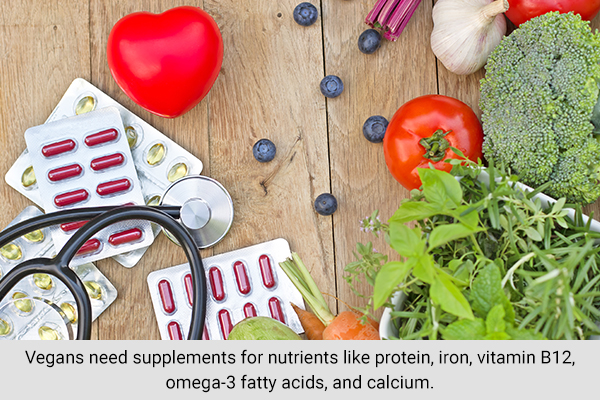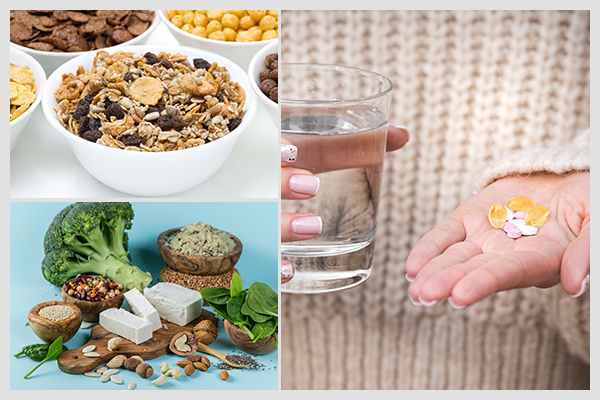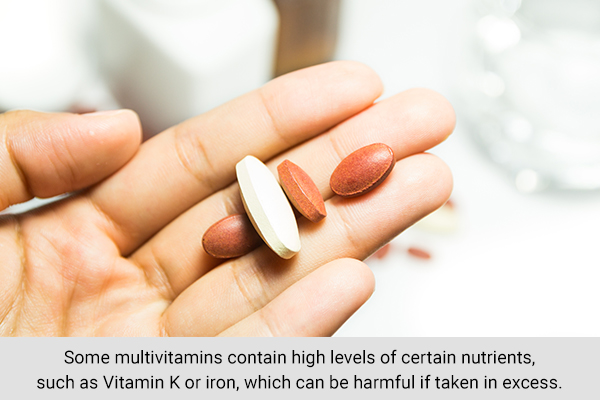In this article:
Vegans may find it difficult to get certain nutrients, such as vitamin B12, omega-3 fatty acids, and vitamin D, as these are often found in animal-derived foods. In these cases, it may be necessary for vegans to consume supplements to ensure that they are not deficient in any nutrient.

If you’re a vegan, do speak with a healthcare professional or a registered dietitian to determine whether supplements are necessary and, if so, which ones are best for you. They can help you to determine the right dosage and frequency for any supplements you may need based on your individual needs and circumstances.
This article will discuss everything related to the use of multivitamins for vegans. Scroll down to continue reading.
What Does the Term Vegan Mean?
Vegan people are those who generally follow a lifestyle and dietary choice that excludes the use of animals for food, clothing, or any other purpose.
People who follow veganism do not consume meat, poultry, fish, dairy products, eggs, or any other animal-derived products. They also do not use any animal-derived products, including leather, fur, and wool.
Veganism is based on the belief that animals deserve to be treated with respect and should not be used for human benefit. Many vegans also follow a plant-based diet, which means they primarily consume foods that come from plants, such as fruits, vegetables, grains, legumes, nuts, and seeds. (1)
Why Do Vegans Need Multivitamins and Minerals?
A balanced diet is important for everyone, including vegans, as it provides the nutrients the body needs to function properly. (2)
When following a vegan diet, it is especially important to ensure that all nutrient needs are met, as a vegan diet may make it difficult to obtain some nutrients.
For example, vegans may need to pay extra attention to consuming enough protein, iron, vitamin B12, omega-3 fatty acids, and calcium, as these nutrients may be lacking in a plant-based diet. (3)
It is important for vegans to plan their meals and snacks carefully to ensure that they are getting a wide variety of nutrients. This can be done by including a variety of plant-based proteins, such as beans, tofu, tempeh, and nuts, as well as fortified foods, such as plant-based milk and cereals, which can provide important nutrients such as vitamin B12. (4)(5)
Eating a variety of fruits, vegetables, whole grains, and legumes can also help vegans meet their nutrient needs. In addition to a well-planned diet, some vegans may choose to take supplements to help ensure they are meeting their nutrient needs.
It is important to speak with a healthcare provider to determine which supplements if any, may be necessary.
What Kind of Additional Nutrients Do Vegans Need?

Nutrients to consider when planning a vegan diet include protein, iron, vitamin B12, omega-3 fatty acids, calcium, and zinc.
1. Protein
A concern for vegans is getting enough protein in their diet, as animal-derived foods are typically good sources of protein.
However, many plant-based protein sources can be included in a vegan diet. Some examples are beans, lentils, tofu, nuts, and seeds. It is important for vegans to include a variety of these protein sources in their diet to ensure they are obtaining all of the essential amino acids. (6)
In addition to whole foods, vegans can also get protein from protein powders and supplements, such as pea protein, soy protein, and brown rice protein.
2. Iron
In some cases, a vegan diet may not provide enough iron to meet an individual’s needs, particularly for women of childbearing age and pregnant women, who have higher iron needs. (3)(7) In these cases, a healthcare practitioner may recommend an iron supplement.
3. Vitamin B12
Vitamin B12 is an essential nutrient necessary for the production of red blood cells, DNA synthesis, and the proper functioning of the nervous system. It is found almost exclusively in animal products, such as meat, poultry, fish, dairy products, and eggs. (4)
One concern for vegans is getting enough vitamin B12 in their diet, as it can be difficult to obtain from a plant-based diet. Vitamin B12 deficiency may lead to anemia and neurological problems.
To ensure adequate intake of vitamin B12, vegans can include fortified foods in their diet, such as plant-based milk, cereals, and nutritional yeast. (4)
It is important to carefully read labels so as to determine which nutrients are added and in what amounts. (8)
4. Omega-3 fatty acids
There are three main types of omega-3 fatty acids: alpha-linolenic acid (ALA), eicosapentaenoic acid (EPA), and docosahexaenoic acid (DHA). ALA is found in plant-based foods, such as flaxseeds, chia seeds, and walnuts, while EPA and DHA are found primarily in fatty fish.
One concern for vegans is getting enough EPA and DHA in their diet, as these forms of omega-3 fatty acids are not as easily found in plant-based foods. The body can convert ALA into EPA and DHA, although the efficiency of this conversion can vary. (9)
To increase their intake of EPA and DHA, vegans can include algae-based supplements in their diet. It is also important for vegans to include plenty of ALA-rich foods in their diet, as this can help support the production of EPA and DHA.

5. Calcium
Calcium is an important nutrient for vegans, as it helps to build and maintain strong bones and teeth. It is also essential for blood clotting, muscle function, and the proper functioning of the heart, nerves, and other muscles.
Good sources of calcium for vegans include leafy green vegetables such as broccoli, kale, and spinach, as well as fortified plant milk, tofu, almonds, and tahini. (10)
It is also possible to take calcium supplements, although it is generally best to try to get nutrients from whole foods whenever possible.
6. Zinc
According to research studies, there can be zinc deficiency in vegetarians if a proper amount of zinc intake is not fulfilled. Still, there are not much differences between vegetarian and non-vegetarian zinc concentrations.
However, to fulfill the adequate intake of zinc concentration in vegetarians, they should take whole grains, fortified cereals, legumes, dairy products, tofu, tempeh, nuts, and seeds, which can be good sources of zinc for vegetarians. (9)
Benefits of Multivitamins and Minerals for Vegans
While a varied and balanced vegan diet can provide most of the nutrients that a person needs, there are some nutrients that may be difficult for vegans to obtain in sufficient quantities. These include vitamin B12, omega-3 fatty acids, and vitamin D.
Taking a multivitamin can help to ensure that vegans are getting enough of these nutrients as well as others that may be more difficult to obtain from plant-based sources. (11)
Some potential benefits of taking a multivitamin for vegans may include: (12)
- Improved energy levels and overall health
- Strong immune system
- Healthy nerve function
- Healthy red blood cells
- Proper muscle function
- Normal blood pressure
- Strong bones and teeth
Keep in mind that multivitamins are not a replacement for a balanced diet. They are meant to supplement a healthy diet and should not be used as a sole source of nutrition.
Potential Risks and Drawbacks of Multivitamins and Minerals

There are potential risks and drawbacks to taking multivitamins, although these risks and drawbacks may depend on the specific product and the individual taking it.
Some potential risks and drawbacks of multivitamins include: (13)
- Overconsumption of certain nutrients: Some multivitamins contain high levels of certain nutrients, such as vitamin K or iron, which can be harmful if taken in excess.
- Interactions with medications: Certain supplements may interact with certain medications, either increasing or decreasing their effectiveness. Before starting a new supplement regimen, it is important to speak with a healthcare professional or a registered dietitian to ensure that there are no potential interactions with the medications that you are taking.
- False sense of security: Some people may rely too heavily on multivitamins and other supplements, thinking that they can make up for an otherwise unhealthy diet. It is important to consume a varied and balanced diet to ensure that you are getting all the nutrients your body needs, in addition to the supplements you are taking.
- Cost: Some supplements can be expensive, and there is never any guarantee that they will provide any additional health benefits. It is generally best to try to get your nutrients from whole foods whenever possible, as these tend to be more economical and have the added advantage of providing other beneficial compounds, such as fiber and phytochemicals.
Final Word
Individualized nutrition planning is important for all individuals, including vegans, as everyone has unique nutritional needs and goals. Factors that can impact a person’s nutritional needs and goals include age, sex, weight, height, activity level, and overall health.
A registered dietitian or other healthcare professionals can help vegans to create a personalized nutrition plan that meets their individual needs and goals. This may involve taking into account the following:
- Caloric needs: The number of calories a person needs can vary depending on their age, sex, weight, height, and activity level.
- Macronutrient needs: Protein, carbohydrates, and fats are the three macronutrients that provide energy and support the body’s functions. (2)
- Micronutrient needs: Vitamins and minerals are essential for good health, but they are needed in smaller amounts than macronutrients. (2)
Overall, individualized nutrition planning can help vegans to ensure that they are consuming a varied and balanced diet that meets their unique nutritional needs and goals.
- Was this article helpful?
- YES, THANKS!NOT REALLY


